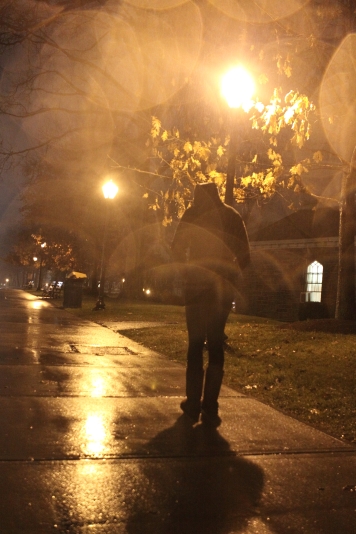By Amina Bhatti
On Thursday, Nov. 20, the Campus Assault and Relationship Education program (CARE) held a meeting to address the handling of sexual assault and misconduct on campus. Sexual assault has been heavily featured in the media in recent years, sparking dialogue between students and administrators.
The forum was hosted in Faber Hall by the United Student Government (USG) of Rose Hill. The speakers were Christopher Rodgers, assistant vice president and dean of students at Rose Hill, and Kimberly Russell, assistant dean of students and director of residential life, also from Rose Hill.

- Fordham deans attempted to clarify how Fordham treats sexual assault cases. Christian Wiloejo/The Ram
While the CARE program deals with all forms of assault and misconduct, the main focus of the meeting was sexual assault and misconduct. Rodgers began the presentation with a few case studies portraying scenarios of sexual assault cases that could arise, including situations in which the victim is taken advantage of when intoxicated, in which both the victim and the assailant are intoxicated and where the victim is assaulted when walking home alone at night.
In 2013, 14 sexual offense reports were filed at Fordham University, 10 of them at Rose Hill. Three of these reports were moved forward to investigation by the dean of students. Rodgers mentioned that these reports included incidents of off-campus sexual harassment and unwanted touching.
Depending on the nature and severity of the assault case, and often at the discretion of the student reporting the assault, the case may or may not be reported immediately to municipal and federal authorities, Rodgers explained.
However, he pointed out that “all [cases] are mandatory reports at the end of the year when we report our statistics to the Department of Education.”
According to the deans, whether or not a student reports assault, it is imperative for campus security authorities to report a crime, or what they believe may be a tantamount to a crime to higher authorities. Members of the campus security authorities include university administration and health services, Public Safety staff, resident and commuter assistants, resident directors and faculty “pertaining to sexual misconduct,” according to the CARE presentation. If a student reports sexual assault to any member of campus security authorities, then it must be reported to the proper authorities. Meetings with a clinical counselor at Fordham’s Counseling and Psychological Services or a pastoral counselor in Campus Ministry are recommended and confidential.
Rodgers further explained that, rather than referring to the parties involved as “victim” and “perpetrator,” the individual who files case of assault is referred to as the “complainant,” and the individual whom the complaint is filed against is known as the “respondent.” This allows for more objectivity in an investigation where facts are still being gathered.
However, especially in cases where there is not much physical evidence or many outside witnesses to an assault, Fordham uses a standard of investigation known as “preponderance of evidence,” which, as Rodgers explained, “essentially means that, more likely than not, there was a violation [of the complainant’s rights].”
In addition, Rodgers discussed how the Fordham administration makes an effort “as much as we possibly can, within the limits of law and regulation, [to allow] the complainant [to] decide how to proceed in the process.” The respondent is also given a support
system and the chance to appeal in the case. Both the complainant and respondent are given an administrative support person, who “serve(s) as a resource… making sure that [campus authorities] are always there to share with [the parties involved] that they have are options at every single point [of the process],” according to Russell, who is an administrative support person herself. “We are here from now till the very end of this process, and even after that, [for help and support].”
After their presentation, the deans opened up the floor for questions from students in the audience, who had the chance to remain anonymous by writing their questions on flash cards and handing them to the front to be answered. One question asked about possible courses of action that may imply that a complainant is partly responsible for the assault, often labeled with terms such as “slut shaming” and “victim blaming.”
“Officers are trained not to ask questions like ‘what were you wearing?’, which is out of context…and which would lead the complainant to have feelings of guilt about their own agency in any given incident,” Rodgers said.
Russell noted that such feelings may be present regardless of the efforts of the staff and can often be beyond the control of the process.
However, both agreed that certain questions may have to be asked in order to understand the situation and shed light on the investigation.
“We certainly don’t [allow] questions of ethical and moral judgment,” Dean Rodgers stated.
“One’s tendency to be sexually active or not…is completely irrelevant to whether, on a given night, something specific that was wrong happened to the person.”
A sexual assault case proceeding typically follows the Title IX Student Conduct Process, which Rodger and Russell discussed in detail at the meeting. The process is also outlined on page 16 of the CARE brochure, the link for which is provided on the CARE page of fordham.edu.
Correction: A portion of this article has been amended to more accurately reflect the statements by one of the speakers during the presentation. Also, while it was noted that a student asked a question about “victim blaming,” the speaker used the term “slut shaming.” Both terms are used in the amendment.
